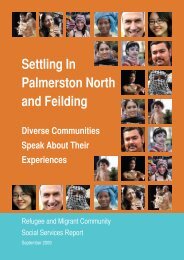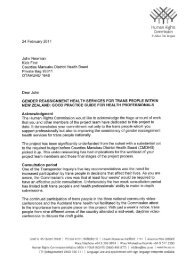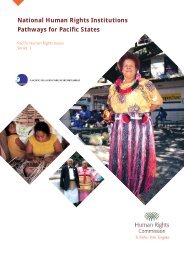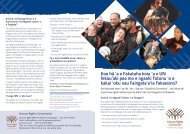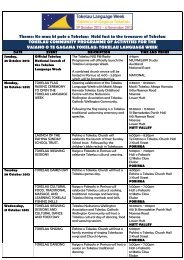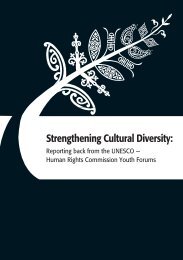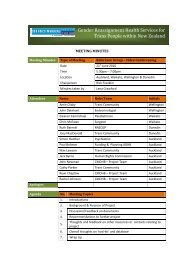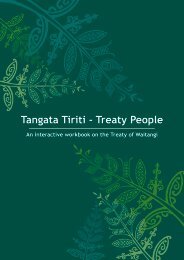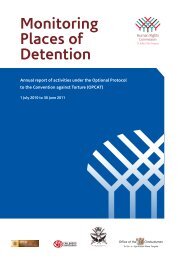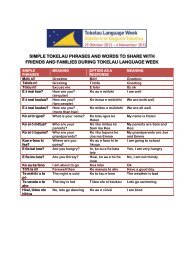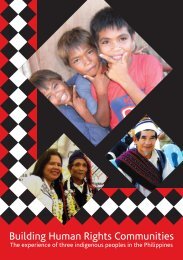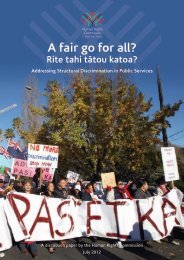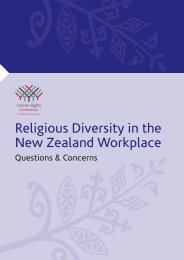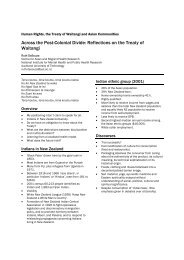Statement of Intent 2013 to 2016 - Human Rights Commission
Statement of Intent 2013 to 2016 - Human Rights Commission
Statement of Intent 2013 to 2016 - Human Rights Commission
Create successful ePaper yourself
Turn your PDF publications into a flip-book with our unique Google optimized e-Paper software.
HUMAN RIGHTS COMMISSION | STATEMENT OF INTENT15making processes about housing, insurance and communitydislocation compound the psychosocial stress experiencedby Canterbury residents. Many are unable <strong>to</strong> move on withtheir lives while they navigate complex insurance assessmentand repair processes, and are largely left out <strong>of</strong> problemidentification and solution design processes. In manyinstances, they are struggling <strong>to</strong> access the informationrequired <strong>to</strong> be able <strong>to</strong> make important decisions.The current housing shortage has been exacerbated by a loss<strong>of</strong> social housing. This is affecting migrant workers arrivingfor the rebuild, families in need <strong>of</strong> temporary housing, andrenters. The Government has acknowledged the rebuild<strong>of</strong> Christchurch is an opportunity <strong>to</strong> make the city moreaccessible, safer, easier <strong>to</strong> navigate and also <strong>to</strong> have moreaccessible housing. In <strong>2013</strong>–14, planned governmentinitiatives are focused on promoting accessible housing.Lessons from the Canterbury recovery will prove useful<strong>to</strong> achieving improved outcomes more widely for peopleacross New Zealand in terms <strong>of</strong> housing, health andaccessibility within the community.What we will doWe are committed <strong>to</strong> working with the people <strong>of</strong>Canterbury, government and non-government agencies,tangata whenua, local authorities and business <strong>to</strong> ensurethat people affected by the Canterbury earthquakesexperience health and wellbeing equal <strong>to</strong>, or better than,international norms in post-disaster recovery, and thatthe Government’s goal <strong>of</strong> making Christchurch the world’smost accessible city is realised.The focus <strong>of</strong> our work will be <strong>to</strong> promote the primacy <strong>of</strong>a human rights approach <strong>to</strong> the Canterbury earthquakerecovery and <strong>to</strong> replicate lessons learnt elsewhere in NewZealand, particularly in decile 1–3 economic areas.We will continue <strong>to</strong> engage with and provide advice <strong>to</strong>central and local government on adopting a human rightsapproach <strong>to</strong> address systemic issues in the development<strong>of</strong> policies and practices. We will provide advocacy andadvice on issues related <strong>to</strong> the recovery for vulnerablecommunities and civil society organisations.We will continue involvement in the development <strong>of</strong>an internationally benchmarked moni<strong>to</strong>ring frameworkthat will work <strong>to</strong> ensure the recovery is inclusive, nondiscrimina<strong>to</strong>ryand meets international best practice.Over time, we intend <strong>to</strong> leverage what we learn from ourfocus on improving outcomes <strong>of</strong> the people most affectedby the Canterbury earthquakes <strong>to</strong> identify what activitieswe might replicate more widely across New Zealand incontribution <strong>to</strong> achieving improved outcomes for the widerNew Zealand population.During <strong>2013</strong>–14, we will:1 advocate for the informing <strong>of</strong> policy-makers andservice providers about psychosocial harm arising out<strong>of</strong> the aftermath <strong>of</strong> the earthquakes, and advocatefor government agencies, civil society and business <strong>to</strong>ensure psychosocial harm is reduced2 advocate for more inclusive services and supportmechanisms <strong>to</strong> improve the wellbeing and whänau ora<strong>of</strong> people living in Canterbury3 facilitate dialogue between key influencers anddecision-makers with affected and vulnerable people <strong>to</strong>ensure their participation in post-earthquake problemdefinition, solution-design and decision-making4 advocate for a human rights approach <strong>to</strong> influencetechnical and legal frameworks on building design,land use and recovery, and accessibility <strong>of</strong> the builtenvironment in Canterbury <strong>to</strong> support human rightsoutcomes5 inform decision-makers on the economics <strong>of</strong>affordable, accessible and healthy housing inCanterbury.Who we will work withOur partners in the moni<strong>to</strong>ring framework include theOffice <strong>of</strong> the Ombudsman, the Office <strong>of</strong> the Audi<strong>to</strong>r-General, the Insurance and Savings Ombudsman, and theSerious Fraud Office. We will maintain our membership<strong>of</strong> The Earthquake Disability Leadership Group andcontinue <strong>to</strong> engage with the business sec<strong>to</strong>r – focusing onthe insurance, banking and property areas – <strong>to</strong> build anunderstanding <strong>of</strong> the human rights implications <strong>of</strong> theiractivities in the recovery context. We will also continue<strong>to</strong> build meaningful relationships with affected people,connecting them with decision-makers and influencers aspart <strong>of</strong> a solutions-focused, citizen-centred approach <strong>to</strong>improving human rights outcomes.



